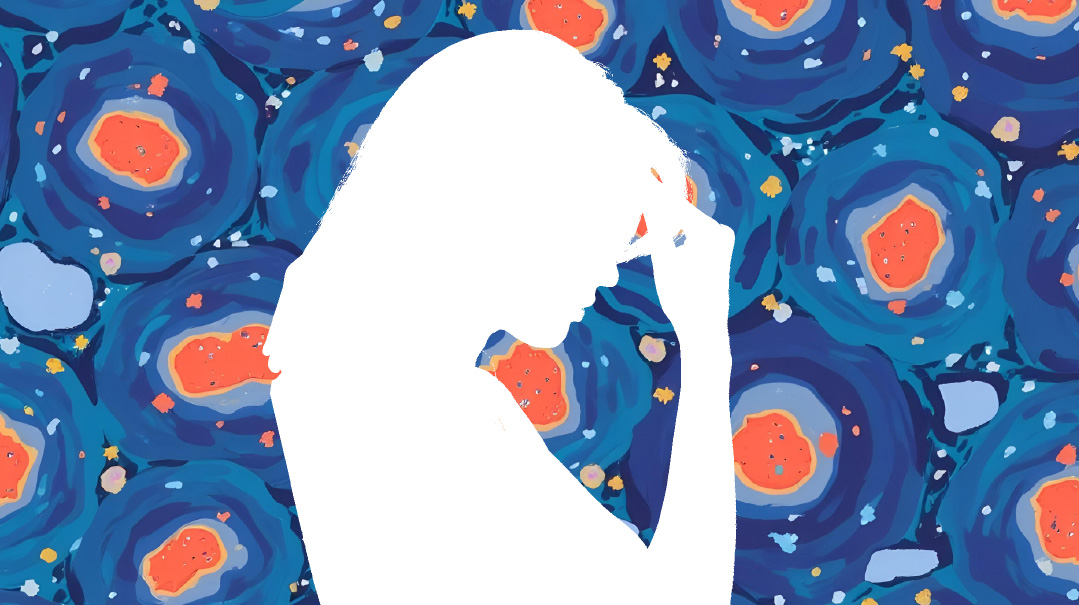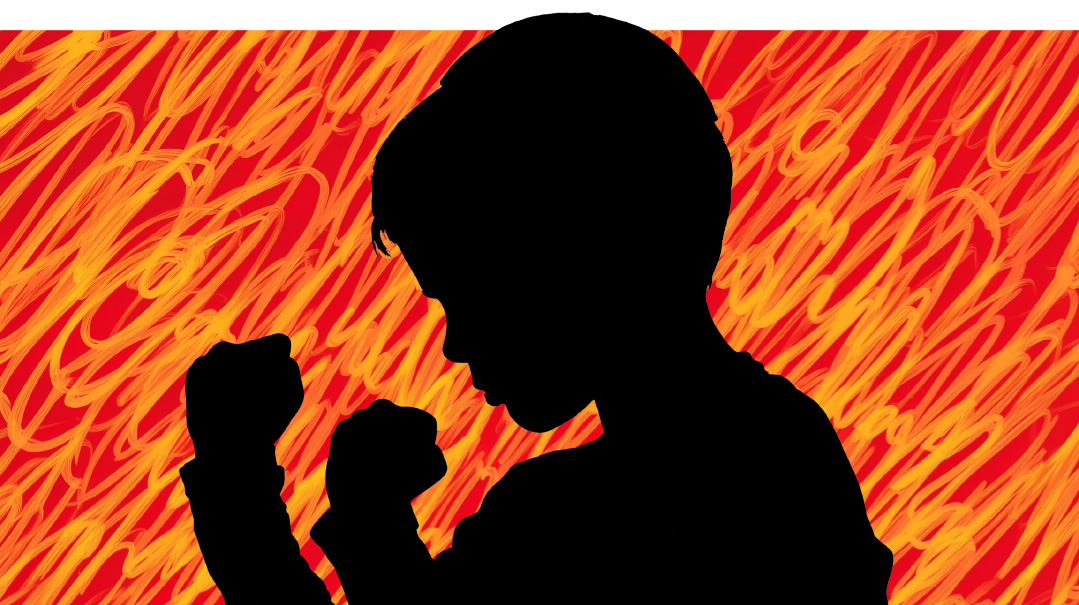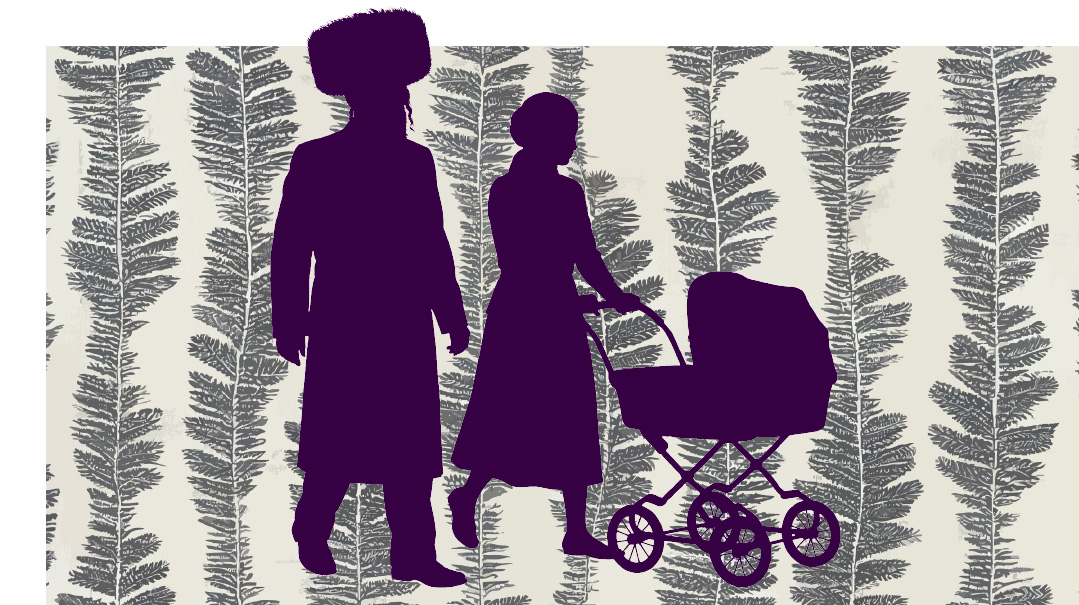My Spouse Has Cancer
| March 18, 2025This is what I’m going through as I watch my husband fight this terrible disease

As told to Shoshana Gross
I
sit on a hard plastic waiting-room chair until my body is molded to the shape of the seat. Waiting. Waiting. Waiting.
Twelve empty hours will pass before my husband emerges from yet another surgery. I can’t force myself to work remotely. I can’t talk on the phone. I can’t even daven. I can’t think. And I don’t want to.
My mind is still spinning with the details, the long lists of who’s picking up who and when, the frantic last-minute instructions to the people who are taking care of the children I leave behind on these monthly trips to the clinic in Alabama, where we’re already up to an experimental treatment on this journey the doctors call “cancer.”
All this, only to be told by a clueless woman, “Well, at least you’re getting a vacation out of it!” My jaws ache with all the things I don’t say. A taut smile masks my burning envy at her banal reply. She is planets away from my nightmarish reality.
I want to tell her that instead of exploring the river in Tuscaloosa, my “vacation” consists of sterile hallways and masked nurses, moments snatched in the gift shop to stock up on Diet Pepsi, jellybeans, and sour pickles (the only kosher offerings) that I can barely choke down. My “vacation” is watching my spouse retch, writhe in agony, or lie pathetically in bed, too sick to lift his hand to scratch an itch. But he’s not too sick to be devastated. My once energetic husband, who reveled in learning, can’t put on tefillin, can’t go to minyan, and can’t support his family. Watching him so emasculated is painful for both of us.
It’s hard not to lose hope.
It’s even harder to remember that barely a year ago I was one of those people who said “yeneh machalah” in hushed tones about people who were decidedly not me or my husband. Now, I say the word cancer. Cancer. Cancer. Cancer. I want to take away the power of the word. I name my foe, and celebrate one small victory in a sea of pain, because whether it’s brain cancer or toe cancer, it changes who you are and how you operate in life.
Beyond the brutal treatments and extreme nausea and hair loss and weakness, there’s a household of scared, bewildered children, a husband trying to keep the fragile shards of a home together, a wife watching her rock of strength crumpling, and a marriage assaulted by extreme stress and financial hardship. The emotional and psychological wounds live under the put-together sheitel and makeup and outfit that may fit better now that I’m living on the “far-away-from-Jewish-communities hospital diet.”
And even when a spouse’s cancer isn’t a “death sentence,” it’s always a life sentence. Like an exploded confetti-filled balloon, scattered pieces are always turning up long after we thought it was all swept away. The effects of cancer, mentally, emotionally, and financially linger long after every hoped-for recovery.
But I’m not alone on this sojourn into the unknown, because a self-appointed “Board of Directors” is always available to tell me what to do.
There’s Mr. Fanatic, who explains that my husband’s illness stems from the length of my sheitel. Reb Simpleton earnestly expostulates that this world is similar to a gumball machine — if I just put in some more pennies of prayer, a sweet, shiny yeshuah will roll into my outstretched palm. If only we went to a certain mekubal, all would be well. Sir Knows-a-Lot wants to know which hospital we’re going to, the exact treatment protocol, and why we’re not doing xyz. Mrs. Psychoanalysis tells me that my husband’s not sick — he just has a deep-rooted need for attention. And naive, clueless Miss Obvious likes to do just that — state the obvious. “You haven’t worked for six months. How are you feeding your family?” Good question. “Your husband has pancreatic cancer? That has a terrible prognosis, right?” Right.
Many of us who deal with cancer in any capacity know these familiar characters. In the support groups I’m part of (baruch Hashem, there are many), we’re all undergoing different trials, with varying levels of financial and emotional support. The common denominator? Most of us have friends, neighbors, and family who care for us, but don’t always know how to abstain from becoming part of the very unhelpful Board of Directors.
There are so many things I need to support my husband, my family, and myself, and there are so many genuinely gracious and dignified ways to reach out.
First, I need to take care of my body in order to be strong for my family. I need food to feel normal, even when everything around me is chaos. Sometimes I’m too stressed to eat, and at other times I feel guilty to bite into that tempting piece of schnitzel when my husband is racked with pain. Make sure I actually eat, and then you’ll know that I’ll have the strength to keep going.
Phone calls, even heartfelt ones, don’t always work for me now (especially the curious, intrusive kind). There’s a time and a place for everything, and this is the time for text messages, little love nuggets that are available for reading on my own time. And please, please, don’t ask me: “How are you?” The true answer is probably horrible. The best thing? “The price of eggs these days is ridiculous!” I want to feel normal sometimes, and being accosted in the cereal aisle by a gooey-eyed groupie just makes me want to cry.
And gifts. I have enough throw blankets to cover my entire backyard with a makeshift tent. My husband could supply the entire ward. Sometimes what I really need is an indulgent chocolate bar. Just ask! I also appreciate the fresh, hot suppers that save my evenings, but it’s important to find out about food preferences. Not every household enjoys meatballs and spaghetti. And another apple-cranberry kugel for Shabbos is going to make me gag.
One of my favorite sayings is, “A bit of grease, a little paint, makes a woman what she ain’t!” Nobody knows what’s going on beneath the facade. Always assume there’s more to the story than you’re privy to — because there is. You can’t see how I feel, or the state of my home, but quiet compassion is treasured. If my little daughter comes to school looking schlumpy, gently fix her ponytail and slip her a snack. Does my son not complete his homework because he chazers with a mother who isn’t fluent in Mishnayos? Offer to tutor him.
One of the nicest things anyone ever did for me was when a friend came over on a particularly difficult day with two mugs of hot chocolate. She sat with me, sipping silently. When she finished, she left, having never said a word, but I was finally warm, both inside and out.
I know you don’t know what it’s like to be where I am, and I hope you never do. And I don’t want to seem ungrateful — the outpouring of love and support from family, friends, and total strangers is incredible — but channeling that chesed properly would be even more incredible.
I need to know someone is thinking about our mundane needs in a way that works for my family. Everyone I’ve spoken to, regardless of age or circumstance or the type of cancer they’re grappling with, agrees on one thing — we all appreciate cleaning help. That’s already been paid for.
What I don’t need is a reminder to lean on Hashem. I don’t need anyone to talk about Mashiach. I hold on to that hope with desperate strength, and my longing is palpable. My sheitel is set, my outfit chosen for the End of Days when all the sick will be healed, and our Nation is finally whole.
Something you should know:
Cancer doesn’t check the box called “nisyonos.” On top of illness, I’m often dealing with many other issues.
I don’t…
…know how we would manage without the Chabad shluchim near far-flung medical centers in random places across the world.
Please understand:
If you also went through cancer and have genuinely helpful advice, tell me once, and let it go. Cancer cases are individual. What helps one person may not help another.
(Originally featured in Family First, Issue 936)
Oops! We could not locate your form.







